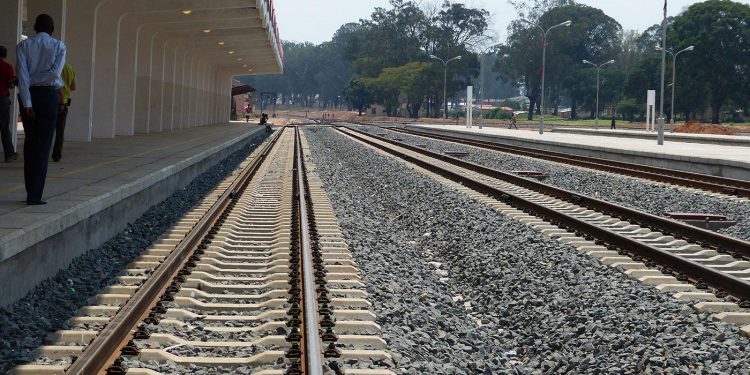Angola and Zambia have signed a concession agreement with the Africa Finance Corporation (AFC) for the infrastructure solutions provider to connect railway lines in both countries, in a deal that illustrates the ongoing tussle for dominance in the electric vehicle (EV) revolution, which includes a scheduled visit by US President Biden to Luanda next month.
- The deal, signed in New York, will see AFC lead the construction of 800km of railway line connecting the Zambia Railways Line from Chingola to the Benguela Line in Luacano, Angola.
- The project will be funded by among others, both governments, the African Development Bank (AfDB), the European Union (EU), and the United States.
- The deal was signed just weeks before US President Joe Biden, serving his last term after withdrawing from the November race, is set to visit Angola (October 10-15), in his first and last visit to the continent.
The rail line is a much needed extension of the Benguela Railway Line which runs through Angola from West to East, connects to Tenke in the Democratic Republic of Congo (DRC), and to the Cape to Cairo Railway.
“The Zambia Lobito Rail Project is an important milestone in our efforts to modernise infrastructure, enhance the competitiveness of our economy, and improve the livelihoods of our people,” Frank Tayali, Minister of Transport for Zambia said.
AFC also signed the first financing deal, US$2 million grant from the United States Trade and Development Agency (USTDA), for environmental and social studies for the project.
The project will create a new trade corridor for Zambia and its neighbour, the DRC, since both countries are landlocked and have to depend heavily on countries with route to the sea, and land transport.
From the Atlantic Ocean to the Indian Ocean
An alternative rail corridor has other ramifications as well. It, for example, creates a rail link between the Port of Dar es Salaam in Tanzania to the Port of Lobito in Angola, connective the Indian Ocean to the Atlantic Ocean. The AFC estimates that it will “economic benefit of approximately $3 billion across both countries, reduce emissions by approximately 300,000 tons per year and add over 1,250 jobs across construction and operations.”
“It will offer the shortest route for export and imports, linking key mining regions, agricultural clusters and businesses in Zambia and DRC to the Port of Lobito. It will significantly facilitate the movement of cargo from the Copperbelt and Northwestern Provinces, through Angola to the Western markets,” the AFC added in a statement.
The investment is part of an ongoing tussle for strategic minerals in the electric vehicle (EV) value chain. The EU and US have been racing to catch up with China on the EV front, and especially on the supply chain.
On October 13-15, President Biden will travel to Luanda, Angola, where he will meet with President João Lourenço of Angola to discuss increased collaboration on shared priorities, including bolstering our economic partnerships that keep our companies competitive and protect workers; celebrating a signature project of the G7’s Partnership for Global Infrastructure and Investment (PGI), which advances our joint vision for Africa’s first trans-continental open-access rail network that starts in Lobito and ultimately will connect the Atlantic Ocean to the Indian Ocean; strengthening democracy and civic engagement; intensifying action on climate security and the clean energy transition; and enhancing peace and security.
White House statement, September 24, 2024
Everyone Gets a Rail Line
In mid-2023, the Lobito Atlantic Railway, a company owned by Trafigura (Singapore) Mota Engil (Portugal) and Vecturis SA (Belgium) signed a three-decade concession to run the Benguela Rail Line. A year later, a bulk cargo vessel named MV Lindsaylou, carrying sulphur meant for the DRC, was the first to dock at the Port of Lobito under the joint venture that saw the cargo transported through the Benguela Railway.
The JV has promised to spend US$450mn on the Angola side of the railway, and US$100mn on the DRC side.
At a geopolitical level, the interest of Western nations in building the route speaks to the importance of DRC’s vast mineral wealth, especially of lithium, copper, and coltan, and to the West’s ongoing tussle with China on infrastructure development and influence in the Global South. A Chinese company reconstructed the existing rail line between 2006 and 2014.
Cut out of the current ongoing development of the rail routes to the Port of Lobito, Beijing has been making a play for revamping the Tanzania-Zambia (Tazara) railway line. In February, China begun negotiations with the two countries that will see China Civil Engineering Construction Corp get a 30-year concession to revamp and run the rail line.
Seen simply, Washington and Beijing are making pragmatic choices about which side of Africa to put their investments in. Each is choosing the ocean that offers the shortest route to them: for Washington, the Atlantic; for Beijing, the Indian Ocean. The economic benefits to the countries’ the existing lines pass through may not extend past construction, but the cargo transported to the ports has ramifications at a global scale. It’ll also create alternative routes to the sea for Kinshasa and Lusaka, hopefully cheaper ones, for much needed imports.
While this practical choice underlines the vast importance of DRC’s, and Central Africa’s, natural wealth especially as demand for minerals for batteries and electronics soars, it also suggests that the global geopolitical tussle is playing out in ways that could make or break the DRC, Zambia, and the region.




